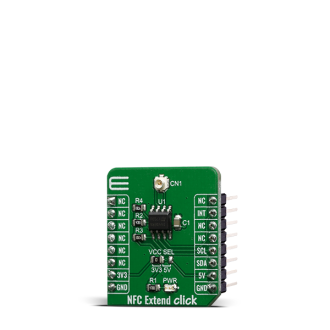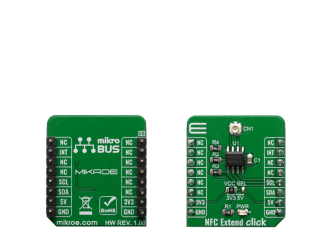
We strongly encourage users to use Package manager for sharing their code on Libstock website, because it boosts your efficiency and leaves the end user with no room for error. [more info]

Rating:
Author: MIKROE
Last Updated: 2020-01-27
Package Version: 1.0.0.0
mikroSDK Library: 1.0.0.0
Category: RFID/NFC
Downloaded: 4639 times
Not followed.
License: MIT license
NFC Extend Click is NFC tag device with possibility of using any shape and size external antenna, offering 16 Kbit of electrically erasable programmable memory (EEPROM). This Click Board offer two communication interfaces. The first one is an I2C serial link and can be operated from a DC power supply.
Do you want to subscribe in order to receive notifications regarding "NFC Extend click" changes.
Do you want to unsubscribe in order to stop receiving notifications regarding "NFC Extend click" changes.
Do you want to report abuse regarding "NFC Extend click".


Library Description
Library contains function for getting INT pin state, for getting and setting registers via I2C, for presenting and writing password, for enabling/disabling mailbox and RF functionalities and for device initialization.
Key functions:
uint8_t nfcextend_password_present ( uint8_t *password_bytes ) - Presenting password to device.uint8_t nfcextend_init ( void ) - Initializing the device.uint8_t nfcextend_enable_mailbox ( uint8_t enable_mailbox ) - Enabling or disabling mailbox.Examples description
The application is composed of three sections :
void application_init ( )
{
nfcextend_i2c_driver_init( (nfcextend_obj_t)&_MIKROBUS1_GPIO, (nfcextend_obj_t)&_MIKROBUS1_I2C, NFCEXTEND_I2C_SLAVE_ADDRESS );
Delay_ms( 500 );
nfcextend_password_present( &default_password[ 0 ] );
Delay_ms( 100 );
init_status_flag = nfcextend_init( );
Delay_ms( 100 );
if ( init_status_flag == 1 )
{
mikrobus_logWrite( "> App init fail", _LOG_LINE );
}
else if ( init_status_flag == 0 )
{
mikrobus_logWrite( "> App init done", _LOG_LINE );
}
}
Additional Functions :
nfcextend_wait_for_int( void ) - waits for INT pin to go LOW and than HIGH for time period of 300msOther mikroE Libraries used in the example:
Additional notes and informations
Depending on the development board you are using, you may need USB UART click, USB UART 2 click or RS232 click to connect to your PC, for development systems with no UART to USB interface available on the board. The terminal available in all MikroElektronika compilers, or any other terminal application of your choice, can be used to read the message.